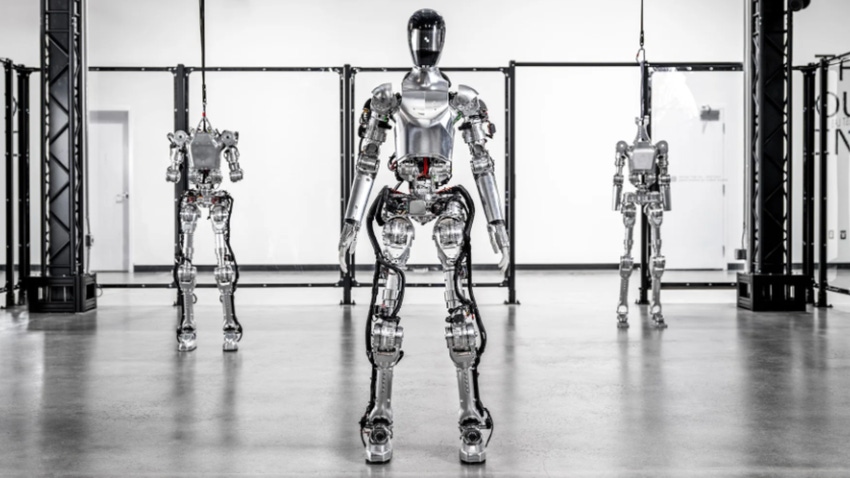AI Startup Roundup: The Startup that Blew Away OpenAI
Also - An enterprise AI assistant startup and Israeli company using AI for underground mapping

Every week, AI Business brings you the latest startup news.
Keep up-to-date by subscribing to the AI Business newsletter to get content straight to your inbox and listen to interviews with AI experts from Fortune 500 companies on the AI Business Podcast on Apple iTunes and Spotify.
Funding news
Figure
Figure is an AI startup that is building general purpose AI robots to do a variety of tasks meant for people. Historically, robots used by enterprises are single-purpose robots.
Based in Sunnyvale, California, Figure said it has signed a partnership with OpenAI to develop next generation AI models for robots - combining the strengths of both startups.
OpenAI entered into the deal because “we see a path with Figure to explore what humanoid robots can achieve when powered by highly capable multimodal models. We’re blown away by Figure’s progress to date,” said Peter Welinder, its vice president of product and partnerships.
Added Figure founder and CEO Brett Adcock: “AI and robotics are the future.”
Last month, it struck a deal with BMW to build general purpose autonomous humanoid robots for auto manufacturing.
The team at Figure includes staff from Boston Dynamics, Tesla, Google DeepMind and others.
Latest funding: $675 million, series B
Investors: Microsoft, OpenAI Startup Fund, Nvidia, Bezos Expeditions (Jeff Bezos’ personal fund), Parkway Venture Capital, Intel Capital, Align Ventures and ARK Invest
Funding plans: Funding will be used strategically for scaling up AI training, robot manufacturing, expanding engineering staff and advancing commercial deployment efforts.
Glean
Glean offers an AI-powered assistant using its search and RAG technology to retrieve up-to-date and relevant information for large language models such that they generate highly personalized answers based on a company’s knowledge base. It is based in Palo Alto, California.
Latest funding: $200 million
Lead investors: Kleiner Perkins, Lightspeed Venture Partners
Other funding: Sequoia Capital, Coatue, ICONIQ Growth, IVP, Capital One Ventures, Citi, Databricks Ventures, Workday Ventures and support from existing investor General Catalyst
Funding plans: It will enable the startup to develop a secure, comprehensive and intuitive enterprise AI platform of the future.
Exodigo
Israeli startup Exodigo uses AI for underground mapping to minimize the need to break ground to find pipes, cables and other assets. It claims to find 20% to 30% more utility lines than other locators and reduces preliminary digging and drilling by up to 90%.
Latest funding: $105 million, series A
Lead investors: Greenfield Partners, Zeev Ventures
Other funding: SquarePeg, 10D VC, JIBE and National Grid Partners
Funding plans: Build out its global team, accelerate development of a self-service product line and support expansion into new markets
AiDash
Silicon Valley startup AiDash is an enterprise SaaS company that uses satellites and AI to analyze vegetation, weather and other risks facing critical infrastructure such as electric and gas utilities.
Latest funding: $50 million, series C
Lead investor: Lightrock
Other investors: SE Ventures, G2 Venture Partners, Benhamou Global Ventures, National Grid Partners, Edison International, Shell Ventures and others.
Funding plans: Funds will be used to fuel growth and double its team to 600 over the next two years. It also plans to open a European headquarters and continue to expand abroad.
Photoroom
Paris-based Photoroom offers an AI-powered photo editor that has been downloaded more than 150 million times in over 180 countries. It processes over five billion images a year.
Latest funding: $43 million, series B
Lead investors: Balderton, Aglae
Other investor: Y Combinator
Funding plans: Funds will be used to expand model capabilities by investing in more GPUs, securing imagery from leading image providers and photographers and doubling the size of the team by the end of 2024.
Novity
Novity developed a solution that it said can predict equipment failures with over 85% accuracy. Its technology combines machine learning and physics-based models. The San Carlos, California-based startup is a spin out from the former Xerox PARC, a research and development center behind some of Silicon Valley’s biggest tech developments.
Latest funding: $7.8 million,
Lead investor: WERU Investment
Other investors: Myriad Venture Partners, Metawater Co. and others
Funding plans: Funds will be used to further enhance its TruPrognostics AI platform, get more customers and improve its software product.
Chiral
Zurich, Switzerland-based Chiral is a nanotechnology company developing the next generation of electronics by using high-speed, automated, robotic machines to place micrometer- or nanometer-sized materials on small chips.
Latest funding: $3.8 million, pre-seed
Lead investors: Founderful, HCVC
Other funding: Grants from ETH Zurich and Venture Kick
Funding plans: Accelerate development of its next machine and expand its team.
About the Author(s)
You May Also Like


.jpg?width=700&auto=webp&quality=80&disable=upscale)
.jpg?width=700&auto=webp&quality=80&disable=upscale)
.jpg?width=700&auto=webp&quality=80&disable=upscale)
.jpg?width=300&auto=webp&quality=80&disable=upscale)
.jpg?width=300&auto=webp&quality=80&disable=upscale)
.jpg?width=300&auto=webp&quality=80&disable=upscale)
.jpg?width=300&auto=webp&quality=80&disable=upscale)
.jpg?width=300&auto=webp&quality=80&disable=upscale)